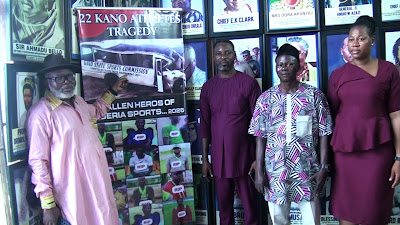By Perekeme Odon
The
nation remains in deep mourning following the tragic loss of 22 young Nigerian
athletes and officials who perished in a fatal road crash on May 31 2025, while returning from
the 22nd National Sports Festival tagged 'Gateway Games' 2024, held in Abeokuta, Ogun State. What was
meant to be a celebratory return for the Kano State contingent turned into a
national tragedy.
 |
Comrade Joseph Evah
|
The
ill-fated vehicle, reportedly carrying 30 passengers—including adolescent
athletes, coaches, medical personnel, state officials, and a journalist—was
making the over 1,000-kilometre journey back to Kano when it veered off course
and crashed near Dakatsalle Bridge, within Kura Local Government Area,
approximately 40 kilometres from the state capital. Survivors have claimed that
the bus, said to be more than 30 years old, suffered multiple mechanical
failures during the trip and had been in visibly poor condition before
departure.
The
incident has drawn widespread condemnation and renewed scrutiny over the safety
measures (or lack thereof) surrounding state-sponsored transport for national
events. Kano State’s commendable medal haul of 29 from the competition now lies
eclipsed by a tragedy that, many argue, could have been wholly avoided.
 |
| (L-R)
Moses
Efeakpokrire, Chief Elijah, Comrade Evah &
Rachael
Nwabi
|
At
a press conference held in Lagos on Tuesday, 3 June 2025, Comrade Joseph Evah,
former President of the Nigeria Skating Federation and Coordinator of the Ijaw
Monitoring Group (IMG), launched a scathing rebuke against the Kano State
Government, accusing it of gross negligence in the handling of logistics for
the state's athletes.
“This was not an accident—it was the
result of systemic negligence,” Evah declared. “We are in a period of mourning,
not just for these 22 promising youths, but for what their deaths represent:
the continued failure of our leadership to prioritise the lives and futures of
Nigerian children.”
Drawing
upon first-hand accounts from survivors, Evah revealed that the vehicle had
suffered repeated breakdowns throughout the journey, pointing to what he
described as administrative recklessness in assigning a decades-old bus for
such a critical trip.
 |
| Team Kano at the Gateway Games 2024 National Sports Festival copy |
“What state, particularly one as wealthy
and culturally esteemed as Kano, sends its youth over a thousand kilometres in
a bus that should have been decommissioned years ago?” he asked. “Would the
same vehicle be used to transport politicians on campaign tours? Would it be
used for a state function?”
Evah
further criticised the government’s response to the tragedy, particularly its
decision to offer ₦1 million in compensation to the families of each deceased
athlete. He described the gesture as deeply inadequate and offensive,
especially in light of well-documented government spending on less urgent
priorities.
“One million naira is not compensation—it
is an insult,” he said. “Politicians waste billions on extravagant lifestyles,
yet families who lost children representing their state are handed envelopes
and platitudes. Where is the dignity in that?”
 |
The Bus
|
He
called upon the Governor of Kano State, Abba Yusuf, and the Chairman of the
National Sports Commission, Mallam Shehu Dikko, to pay personal condolence
visits to the bereaved families and to provide more meaningful reparations.
Evah also demanded the construction of a permanent memorial to honour the 22
fallen athletes.
Referencing
his past advocacy during the 2011 killing of NYSC members in Bauchi State, Evah
underscored the importance of media and civic engagement:
“In this country, life is cheap unless
people rise and demand accountability. When we protested the killings of youth
corps members, the government was forced to act. We must not allow this tragedy
to fade into silence.”
Rachael
Nwabi, of the National Association of Ijaw Female Students Alumni, echoed these
sentiments. She questioned the value placed on the lives of youth athletes and
called for the construction of a national monument bearing the names of the
deceased, ideally within a stadium, to immortalise their sacrifice and inspire
future generations.
“What does ₦1 million mean to a mother who
sent her son to represent his state, only to receive a death notice in return?”
she asked. “At the very least, visit these families. Show them that their loss
has been acknowledged.”
 |
| (L-R)
Comrade Evah, Chief Elijah, Moses
Efeakpokrire, & Rachael
Nwabi |
Chief
Elijah Andrew, Chief of Staff of the Ijaw Monitoring Group, added a sharp
critique of government spending priorities, noting: “It is shameful that in the same country where alleged payments are
made to terrorists, families of national heroes receive mere tokens. These
youths deserved state burials and recognition befitting their contribution.”
Comrade Moses
Efeakpokrire, Secretary of the Niger Delta Peoples Forum, concluded the press
event by calling for a thorough investigation into the incident and legislative
reform around athlete safety and travel provisions. He, too, reiterated the
need for monuments and street namings in honour of the deceased.
This
catastrophe, borne of apparent institutional neglect, has raised far-reaching
questions about governance, safety, and the sanctity of youth life in Nigeria.
It is a call not just for mourning, but for urgent action—to ensure that never
again are young Nigerians sent out to bring glory to their states, only to
return in coffins.









